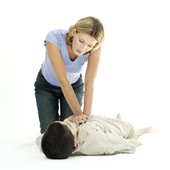Health > First Aid
FIRST AID

Heat and Heat Disorders - Basking in the sunshine can be relaxing and pleasant, but too much heat can cause damage to the body processes and body tissues-so prompt treatment is essential.
Burns - To distinguish a minor burn from a serious burn, the first step is to determine the degree and the extent of damage to body tissues. The three classifications of first-degree burn, second-degree burn and third-degree burn will help you determine emergency care.
Snake bites - People who frequent wilderness areas, camp, hike, picnic, or live in snake-inhabited areas should be aware of the potential dangers posed by venomous snakes.
Electrical shock - The danger from an electrical shock depends on how high the voltage is, how the current traveled through the body, ....
Broken bone - If more pressure is put on a bone than it can stand, it will split or break.
...
Temperature - The body’s sophisticated temperature control mechanism is one of the major features that sets us aside from lower forms of life.
Holiday Health - A happy holiday can be ruined by unexpected illness. But it is possible to protect yourself and your family by taking sensible precautions.
Proprietary Medicines - It’s not necessary to run to your doctor every time you have a minor ailment - a suitable medicine, available from your pharmacy, may be all you need.
Pulse - We view it as the symbol of life itself and in fact the pulse gives doctors valuable information about the condition of the heart and major arteries of the body.
Shocks - The person who is pale ,cold and clammy after an accident is almost certainly likely to be suffering from shock.
Skull fracture - If a casualty has a head wound, be alert for a possible skull fracture. An affected casualty may have impaired consciousness.
Tetanus - A rusty nail, a clumsy step – and the resulting wound could be the ideal breeding ground for the virulent bacterium that causes tetanus. The disease can be fatal, so adequate immunization is of the utmost importance.
Travel Sickness - Some people can cope effortlessly with the roughest sea or air journey - others feel ill before the aircraft has taken off or the ship has even left the dock. The chances of travel sickness can be minimized, however, by taking sensible precautions.
Whiplash - With more cars on the road than ever before, the chances of a whiplash injury- a sprained neck- have increased.
Overdoses - Many people think of an overdose purely in terms of attempted suicide, but accidents with drugs are every bit as common as deliberate misuse.
Hiccups - Everyone has their own personal remedy for hiccups. But what causes hiccups and can they ever be dangerous?
Over Breathing - Over breathing is generally caused by stress and it can produce some very worrying symptoms.
Pulled Muscles - A pulled muscle is an unavoidable hazard of life. But fortunately the inconvenience caused is usually minimal, treatment is simple and recovery rapid.
Resuscitation - The knowledge required to practice resuscitation need not only be the preserve of the skilled hospital emergency team.
Tourniquet - If used at the wrong time and by inexperienced hands, a tourniquet can do more harms than good. But it can halt severe blood loss from a limb in an emergency.
Unconsciousness - Slipping into the dark world of oblivion can be a dangerous journey. Brought on by a variety of causes, unconsciousness ranges in severity from a fleeting faint to a life-threatening or permanent coma.
Wounds - Everyone suffers a wound from time to time. Most of these are simple injuries which heal without any difficulty, but others can sometimes be fatal or result in some kind of permanent disability or disfigurement.
Rabies - Rabies is a viral infection of certain warm-blooded animals and is caused by a virus in the Rhabdoviridae family. It attacks the nervous system and, once symptoms develop, it is 100 percent fatal in animals, if left untreated..
...
Insect Stings - Usually a sting for a bee, wasp, hornet are not serious and are more painful than dangerous. But with any insect bite or sting it is important to look for signs of an allergic reaction.
Choking - Choking is caused when a foreign object, like a hard lump of food, goes into the trachea instead of the oesophagus (food pipe).
Eye injuries - Eye emergencies include cuts, scratches, objects in the eye, burns, chemical exposure, and blunt injuries to the eye or eyelid. Since the eye is easily damaged, any of these conditions can lead to vision loss if left untreated.
|

